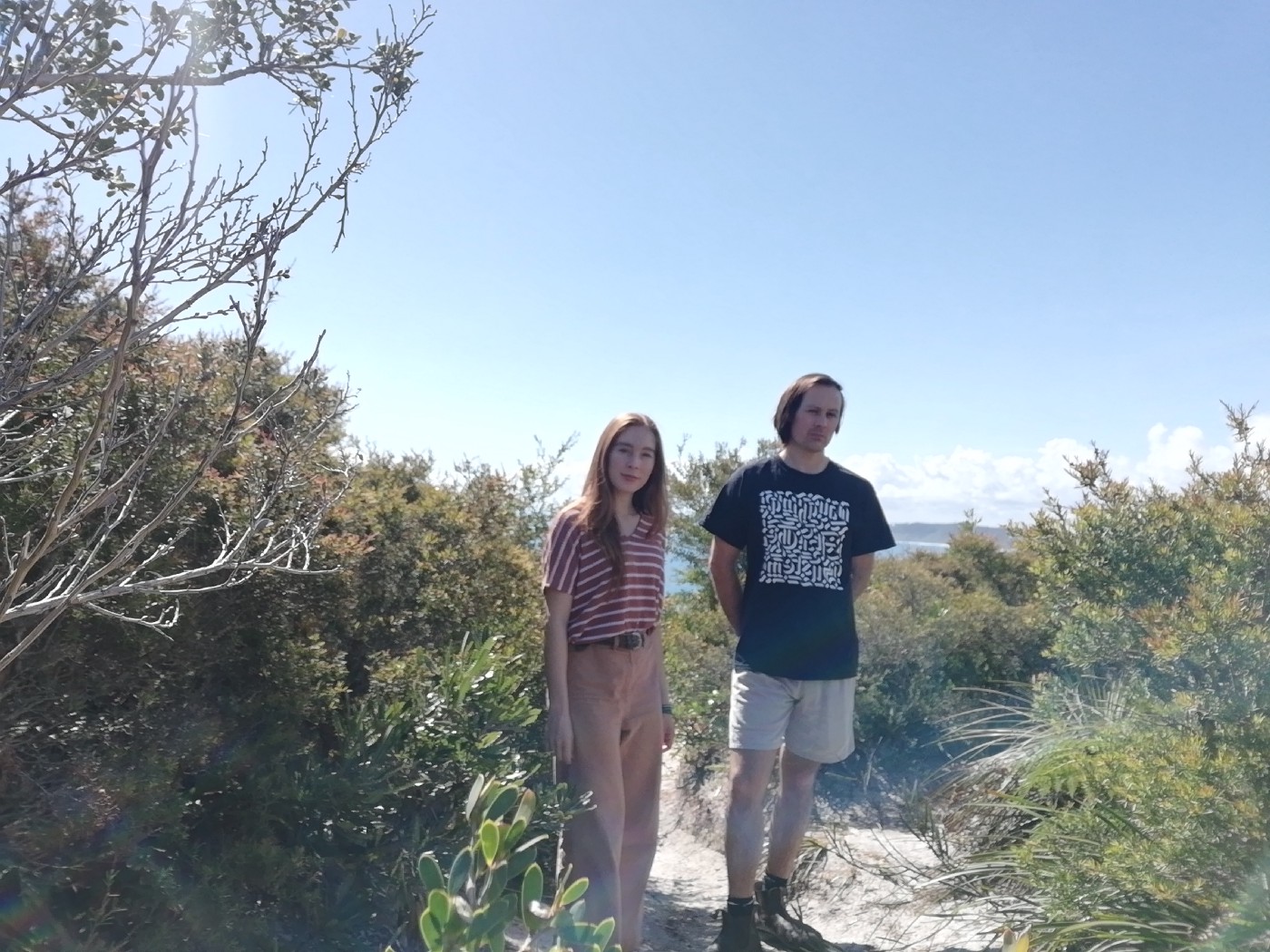Knekelhuis dialogues #1 — Troth
Glad to introduce you to Knekelhuis dialogues. In this series of interviews, we explore what Knekelhuis label artists moves in life and art, where they get inspiration from, and what they are working on in the present.
Meet the first duo — Newcastle-based group Troth (a.k.a. Amelia Besseny and Cooper Bowman), releasing a new album Oak Corridor on the 1st of November.
What first got you into music?
Cooper: Music was always around me growing up, so has been a constant in my life. I only started making noise much later than most, when I was around 21. I was always an obsessive listener though. The first album I bought was 36 Chambers when I was ten or eleven, rap being the first music that made total sense to me given my context. Then a little later punk and later again, electronic music/techno consumed me for awhile. I think the consistent thread across these significant musics for me was the rejection of consensus narratives, a trance-like repetition of sound and often a kind of simplicity. Most of these things also exist in Troth when I think about it.
Amelia: I don’t really remember a time where I wasn’t into music. I think it was a combination of family and community, some encouraging teachers and then meeting Cooper, who gave me great confidence to experiment with the music that I was interested in.
What role does nature play in the music creation process for you?
Cooper: Nature is honestly a wellspring of ideas and is as connected to any idea of ‘spirituality’ (or perhaps ‘cosmology’ is better) that I have found so far in life. It has an influence over all aspects of my life, so definitely feeds into something I believe is vital (making music/art).
Amelia: Nature is a source of inspiration in its patterns and textures, both visually and aurally. The soundscapes found in environments that are unmoved by human impact (though these are less and less), have intricate and subtle layers that prompt us into deep reflection. They provide Troth not only source material but philosophical underpinnings that guide the music.
What is your new album Oak Corridor, dropping on the 1st of November, about?
Amelia: The title Oak Corridor is based around the Corridor of Oaks in the Blue Mountains, which whilst not the most impressive part of this area by any stretch, was a source of inspiration. Our songs feature themes of balance and ebb and flow. Perhaps through it we were encouraging ourselves to have patience and to go with the flow, in light of the two pandemic-ridden years that have been.
Cooper: There are a variety of interwoven themes throughout OC. I guess the key ideas are concepts like balance, truth, simplicity, integrity and a running theme through all of Troth’s output concerned with nature. The main concept of the title is the story of an ancient oak tree in Kew Gardens in England and how it was almost decimated in a great storm in 1987. The caretakers thought that it was going to die, but it was able to bounce back even stronger after the damage it endured and the knowledge gained shaped the way plant cultivation and maintenance was done following. I think it’s a really beautiful analogy for how people can use struggle or suffering and learn from it to become stronger/more resilient as a result. Also, the ‘Oak’ has druidic connotations. The word ‘druid’ has it’s roots in Greek and Celtic language and translates roughly to “oak wisdom” or “knowledge of the oak”, as the druids were basically ‘academics’ of their culture, for lack of a better descriptor. They were keepers of knowledge who maintained a strong oral tradition and helped maintain justice, balance and healing in their societies. Weight Of A Feather is mostly themed around the ancient Egyptian concept of Maat. This was the ruling principle of life, concerning truth, balance, order, harmony and morality. Maat was also the goddess that presided over balance in the seasons/order and was involved in the judgement of people when they died. Part of the process involved the human heart being weighed against a feather to determine it’s integrity (lightness) in life, a pretty beautiful concept. The main idea of The Slowest Dawn is taken from the regular experience of waking up to really loud construction on all sides of us where we live. It’s a pretty scathing comment on how quickly Newcastle (and many other places) has been developed without any forward planning or thinking about how people could live and thrive in a place. Elkhorn is about spaces reclaimed by nature and also the symbiotic relationships in the Elkhorn plant (which is made up of many little plants sometimes called “eyes”). In Lore is vaguely themed around an episode of the show Grand Designs, where an old record executive knocks down a perfectly fine existing house to build a multi-million dollar lighthouse. Basically it never gets completed, ends up breaking up his family and is horrible even to watch. I think the message is about being thankful and also avoiding the trappings of excess and self-aggrandisement. There is also an implicit message that love is the law, not anything else. A beacon if you will, to continue the lighthouse analogy. Balancing Arc maybe has some aspects of Eastern religion / contemplation in its lyrics. There’s reference to the detours of life — focusing on the positive aspects and not being deterred by the bends in the road. I was also largely influenced by Amelia and I’s relationship in the lyrics, as abstracted as they are, there is a lot of positivity in them.
Who inspired you to create the Oak Corridor album?
Amelia: I’d like to think that we inspired each other.
Cooper: The simple answer is Amelia. I don’t think any other music projects specifically inspired what I contributed to Oak Corridor. I’d say it was an organic process in the truest sense, in that it grew and accumulated through its own volition, often from very small ‘seeds’. Otherwise, we’re probably most influenced by our friends, we’re lucky to know a lot of very talented people and just talking to them is immensely inspiring. With Oak Corridor, we developed specific ideas of what messages needed to be conveyed through the songs and the best kind of songs that would serve as vehicles for that. From there we collaborated, bouncing sounds off of each other until they were in a form that hopefully conveyed those themes as authentically as possible.
If we make things in collaboration with nature, who is the creator?
Amelia: I think we’re almost always a co-creators, in any situation, because the influence of your surroundings, mentors and grievances always shape the art made. It might sound a bit new age, but I don’t consider myself as separate from nature, so the creation/creative process is always entwined.
Cooper: That is obviously a question way deeper than can be answered in a brief Q&A! I, personally, am shaped by all kinds of stimuli and nature happens to be one of the primary forces in the last few years for me, especially for my input in Troth.
Having said that, there are greater questions at play about what necessitates anyaction, what our own agency is and what motivates us. I believe actively engaging with nature offers a really helpful perspective on our own smallness and also to reinforce how vital it is to be adaptable and resilient, like the oak tree mentioned above. Nature is chaotic and often brutal, but also capable of immense beauty, so for me its great contrasts are a useful analogy for experience more broadly.
With Oak Corridor, I also started thinking of the songs as rituals in a sense. That they hold a certain power, even if it is not immediately intelligible to a listener. I wanted to put positive, or at least useful, messages out into the ether. Lord knows there are enough negative forces to contend with out there. Ultimately, Troth is a conversation between Amelia and I. We both have strong relationships with nature, individually and together, so there is always going to be a strong thread of those relationships in what we do.
Listen to the upcoming album here.

